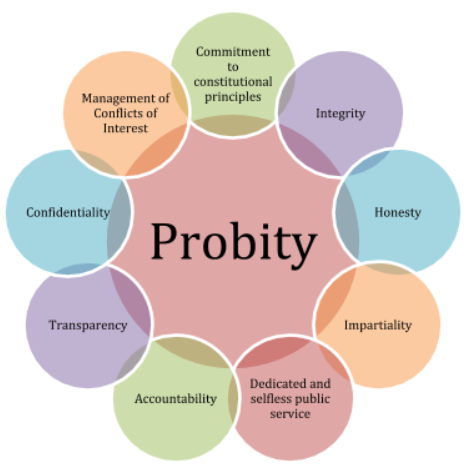Ethics
Probity in Governance
- 11 Oct 2022
- 6 min read
For Mains: Principles of Public Services, Utility of Probity in Governance, Philosophical underpinnings of Probity and Governance
What is Probity?
- Possessing a comprehensive understanding of moral principles and ethics is the attribute of probity.
- Honesty, morality, and integrity are the attributes of probity. It refers to moral conduct that respects human values and guarantees fairness, accountability, and openness, all of which inspire trust among the populace and encourage participation in the governance process.
- Upholding probity in governance involves more than just refraining from corrupt or dishonest actions. It refers to moral behavior that upholds community ideals and ensures justice, accountability, and transparency, all of which foster public trust and promote civic engagement.
- In contrast to merely avoiding unethical or corrupt behavior in one's personal and professional life, probity reflects the absolutist way of living, in which one upholds the highest goals and standards.
What is Probity in Governance?
- The term probity is derived from the Latin ‘probitas’, which means "honest."
- Absence of corruption is a fundamental need for guaranteeing probity in governance.
- Probity in governance is the term used to describe the existence of strong ethical and moral norms inside the governance process. Honesty, accountability, integrity, compassion, and other positive traits make for excellent governance.
- Probity in Governance seeks to fulfil the following purposes:
- Probity preserves the public's faith in government operations.
- Integrity in public services is maintained by probity.
- Probity encourages government accountability.
- Probity guarantees that protocols are followed.
- It seeks to avoid the potential for misconduct, fraud and corruption
What is the Concept of Public Services?
- Social activities that take place in public are referred to as public service. One must acknowledge the necessity of principles in public service while considering the fundamental tenets of public life. An ethical code serves as a guide to help public officials uphold the highest standards in their conduct.
- Public service encompasses all parts of daily life that the government delivers, such as health care, education, infrastructure, and law and order.
What are the Seven Principles of Public Services?
- Selflessness:
- Decisions should only be made in the public interest by those holding public office. For the sake of obtaining money or other materialistic advantages for themselves, their families, or their friends, should be avoided.
- Integrity:
- Holders of public office should avoid putting themselves in any kind of debt to outside parties or groups that might impact how they carry out their official obligations.
- Objectivity:
- Holders of public office should make decisions based on merit while performing its duty, such as appointing public officials, granting contracts, or suggesting people for prizes and perks.
- Accountability:
- Holders of public office are accountable for their decisions and actions to the public and must submit themselves to whatever scrutiny is appropriate to their office.
- Openness:
- All decisions and actions that public office bearers should be as transparent as possible. When the larger public interest plainly requires it, they should provide justification for their choices and only restrict information when necessary.
- Honesty:
- A public office bearer must declare any private interests that could conflict with their duties and take measures to address any conflicts in a manner that safeguards the public interest.
What is the Philosophical basis of Governance and Probity?
- Indian scriptures and other treatises, including the Ramayana, Mahabharata, Bhagvad Gita, Buddha Charita, Arthashastra, Panchatantra, Manu smriti, Kural, Shukra Niti, Kadambari, Raja Tarangani, and Hitopadesh, have extensively addressed the ethical issues of governance.
- Immanuel Kant places the idea of obligation at the center of morality, arguing that humans are obligated to follow the categorical imperative to respect other rational beings with whom they come into contact out of awareness of their duty as rational beings. Kant believed that tackling the issues of moral philosophy would be equally successful if the same reasoning techniques were applied rigorously.
- The utilitarian perspective, which asserts that the maximization of pleasure for the largest number of people should be the standard of behavior.
- According to Aristotle, virtues (including justice, kindness, and generosity) are propensities to act in ways that are advantageous to both the person who possesses them and the community of which they are a member.
UPSC Civil Services Examination, Previous Year Questions (PYQs)
Q. What do you understand by probity in governance? Based on your understanding of the term, suggest measures for ensuring probity in government. (150 words)
Q. Write short notes on the following in 30 words each: (2022)
(i) Constitutional morality
(ii) Conflict of interest
(iii) Probity in public life
(iv) Challenges of digitalization
(v) Devotion to duty







